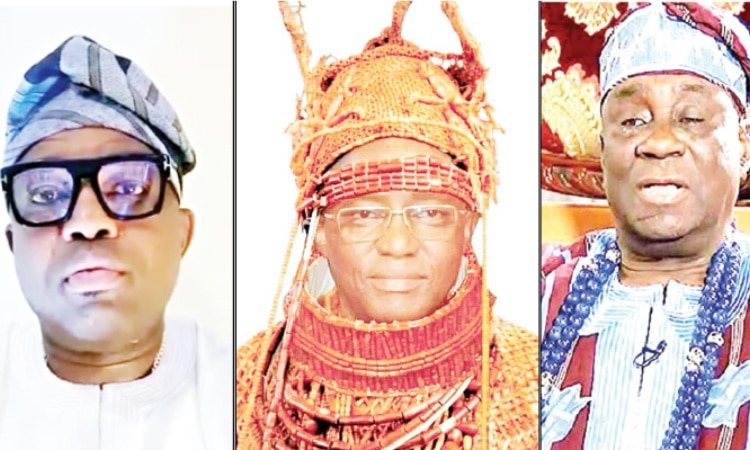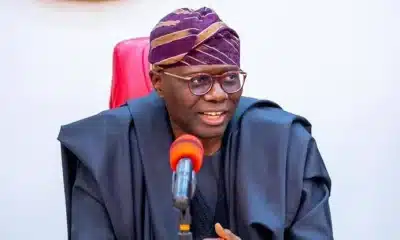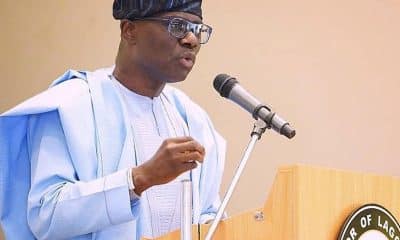Gist
Eko Founders: Academics, Olota, Lagos Chief Challenge Oba Of Benin

The recent statement by the Oba of Benin, Oba Ewuare II, asserting that the origin of Lagos can be traced back to the Binis, has generated significant opposition.
Notably, the Olota of Ota, Oba Adeyemi Obalanlege, a prominent Awori monarch, along with some academics and a chief in Lagos, has strongly contested the Oba of Benin’s claim.
The controversy arose when Oba Ewuare II, during a visit to Lagos State Governor Babajide Sanwo-Olu on Sunday, made the assertion despite anticipating potential mixed reactions.
The monarch’s bold statement has ignited debates, particularly on social media, with diverse opinions emerging on the historical narrative of Lagos’s foundation.
Oba Ewuare said, “It is in the history books that the Binis founded Lagos. When some people will hear it now, they will go haywire; what is the Oba saying there again? But it is true. Go and check the records. Maybe not all over Lagos as we know it now, but certain areas in Lagos, maybe the nucleus of Lagos, were founded by my ancestors. The Oba of Lagos will say so.
“Over time, controversy has consistently surrounded the true historical ownership of Lagos, with some perspectives even suggesting that “Lagos is a no man’s land.”
The remarks made by the Oba of Benin on Sunday continue to generate controversy in certain circles.
The Balogun of Eko, Abisoye Oshodi, in a viral video, faulted the claim by the Oba Ewuare II that the Binis founded Lagos.
In a video shared online on Tuesday, the Lagos chief said, “With all due respect to the Oba of Benin, Oba N’Edo Uku Akpolokpolo Ewuare II; Sir, may you live long.
“Point of correction Sir, Lagos was never founded by the Binis. I am glad that you said some parts of Lagos, not the entire Lagos. You are right; your ancestors settled on a small Island that was called Eko then, before the creation of Lagos. On this very Island, they never created it.
“The Island had been there before the arrival of your ancestors. Your ancestors only came and forcefully imposed a taxation system on transit with the traders on the land called Idu Ighoran. Whatever that means in Benin, I do not know, but there have been other tribes on the Island before the creation of Lagos, even before the creation of Eko.
“We have the Aworis; we have the Isheris; we have the Olofins; so many tribes have been on Lagos, or the modern Lagos now before the creation of Lagos State.”
Comedian Oluwaseyitan Aletile, widely recognized as Seyi Law, who actively participated in the discussion on X, stated, “The distortion of our history in the South-West will never cease to amaze me.”
“The same way some Itsekiri warriors settled in Epe was the same way some Benin warriors settled in Isale Eko of Lagos Island. The journey of the Binis to Lagos was a joint war of the Binis and Itsekiris against my ancestor, the King of Mahin Kingdom, Oba Alagwe.
“When the history of Lagos is written today, and the Ilajes are excluded, I just laugh. The Mahis (Mahin) who have alluded to in several books are Ilajes,” his post on X via @seyilaw1 partly read on Tuesday, adding, “Let those revising history continue, but some of us will resist it with time.”
However, some academics who weighed in on the issue challenged the Oba of Benin’s statements, although they acknowledged the historical connection between the Yoruba and the Binis.
Dr. Paul Akanmidu, a History lecturer at Adekunle Ajasin University, Akungba-Akoko, asserted that the history of Lagos is more closely linked to the Awori people from Abeokuta, Ogun State.
According to information available on Wikipedia regarding the Awori tribe, they are a subgroup of the Yoruba people who speak a dialect of the Yoruba language.
The Awori people are recognized as the original inhabitants of Lagos and certain parts of Ogun State, specifically Ado-Odo/Ota Local Government Area. The Awori community is traditionally associated with land ownership, farming, and fishing activities.
Dr Akanmidu said, “Historically speaking, you cannot get a straight-jacketed analysis of such a historical development. There is going to be a divergent opinion. If somebody stands before you and you call out people to give comments about that individual, each individual is going to give his or her perspective.
“It would be a historical distortion for the Oba of Benin to claim that they founded Lagos; it is not true. If you go by historical analysis of the development of the Yoruba and the relationship of the Yoruba with Benin, it was even averred that if Benin was having a problem, they had to send to the Alaafin of Oyo at that time, who sent somebody to them (the Oranmiyan) to help them.”
The lecturer said Lagos was developing as a Lagoon, noting that the Abeokuta people, the Awori, “when they hear such a comment made by the Oba of Benin, it’s like you’re giving a slap to historical development.”
“What we know in history is that Lagos was founded by the Aworis from Abeokuta. Look at the historical proximity of their place to that place; they were fishermen who were there at that time doing their fishing. I’m not disputing the fact that the Benin people must have come there because the Ilaje people also came, but people were coming from different places to tap into the benefits of that particular location.
“For the Oba now to claim such, it is a slap on the history of the Awori people who have been known to have been there several years before those people (Binis) came. They (the Binis) may come later and contribute to other aspects of Lagos, but to say that Lagos was founded by them is a historical distortion.”
In his concluding remarks, Akanmidu agreed that a significant historical relationship exists between Lagos and Benin, similar to the strong ties shared by the Yoruba people.
“The earliest people who have been there are the Aworis. If there would be anybody who would claim that place, it would be the Awori. Some people also came from Liberia and Sierra Leone when they returned from America, being initial slaves. We call them the slave returnees; that’s why you hear different kinds of names in Lagos. The history of Lagos is woven in diversity,” he added.
From a different perspective, Professor Akinsola Agagu, a Political Science scholar at Ekiti State University, emphasized that history has the potential to be contentious and subject to varying interpretations.
“History itself is controversial, and it’s not an exact science. The Oba of Benin gave room to his position. Lagos is a very large expanse of land. Even as big as Lagos is today, some can still occupy some outskirts of the town, and in the next 10 years, when it grows, they can still lay claim that they founded it.
“So that’s what I think is the problem with the position of the Oba. Since Lagos has been a cosmopolitan place, it is easy for people to claim to have been the founders. The Binis, this is not the first time they would lay claim to such; they have at one time or the other, either this Oba or his predecessor, claimed they also founded Ile-Ife.
‘They have always been generating controversy about their relationship with some of these Yoruba towns, and for him to have said this, one would say it is not the first time they would make such a claim. But as many people would say, it is far from being the truth. They can occupy a small portion, but to say they have founded Lagos, that limits their knowledge of history or of how places are founded,’’ the don said.
Prof. Agagu noted that “Lagos is a home of the economy. It’s a place that has a pull effect; it has pulled so many people down there, and eventually, everybody has become a Lagosian. It is also possible for these people (the true inhabitants) to be swallowed up. It has been a place that pulls because of the potential to pull wealth.
“Everything has melted, and everybody has become a Lagosian. And this has absorbed even the original inhabitants.”
Speaking on the connection between the Benin people and the Lagosians, he said, “For the core Yoruba people, they have always believed that they are one and that the Oba of Benin happens to be one of the children of Oduduwa (believed to be a Yoruba divine king and legendary founder of the Ife Empire).
“Even though in an attempt to contend that they have not claimed that there is no relationship that shows affinity. The second one is that the Western region, then, extended to Edo, and even Delta. So they had been together. We didn’t see ourselves as two different people, not until the Mid-Western region. They have been one people. The free education policy that the late Chief Obafemi Awolowo started was enjoyed from Oyo to Ogun to Delta.
The Olota of Ota, Oba Adeyemi Obalanlege, contested the assertions of the Benin monarch, accusing him of distorting the historical facts about Lagos.
Referring to the Oba of Benin as an attention seeker, the Olota affirmed that comprehensive historical records consistently affirmed the Awori people’s ownership of Lagos.
In an exclusive conversation with The PUNCH, Oba Adeyemi Obalanlege, who serves as the chairman of Awori Obas in Ogun State, steadfastly maintained that the Benin monarch’s claim was both untrue and lacking in foundation.
He said, “When something is beautiful, a lot of people will want to lay claim to it. But Oba of Benin was being economical with the truth. He is only an attention seeker.
“We have discussed this several times, and as Awori people, we have made our point.
“Just go anywhere; even these Europeans that wrote so many books wrote that the Awori are the ones that deflowered Lagos, having lived in the state for quite a long time, even before the coming of the Portuguese.
“It was the Benin people that came later, and they only occupied a very small space in Lagos.
“So, we are still their landlords. They can lay claim to whatever, but to be truthful, the Oba of Benin was only being economical with the truth.
“This is my position as the chairman of Awori Oba in Ogun State, and you know that Awori started from Ogun State. The movement of the Awori started from Ota here in Ogun State.”












